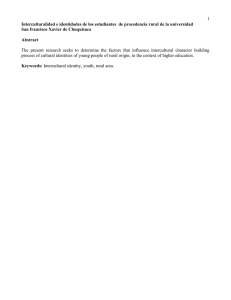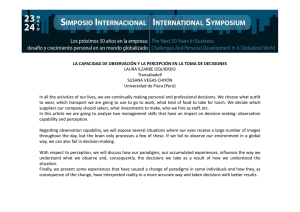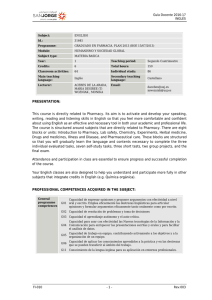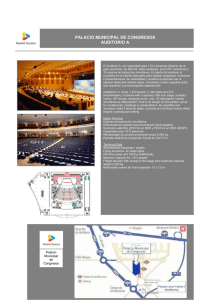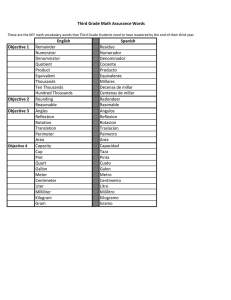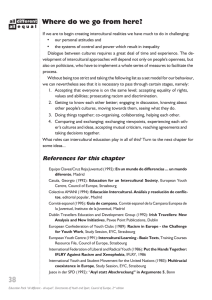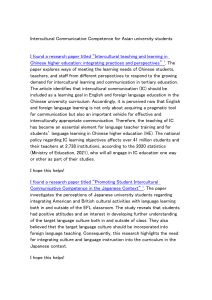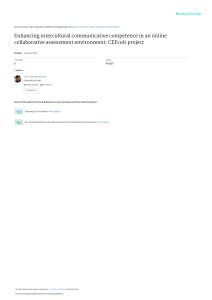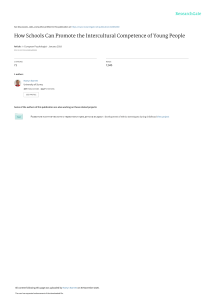PRESENTATION: The purpose of this course is to examine
Anuncio
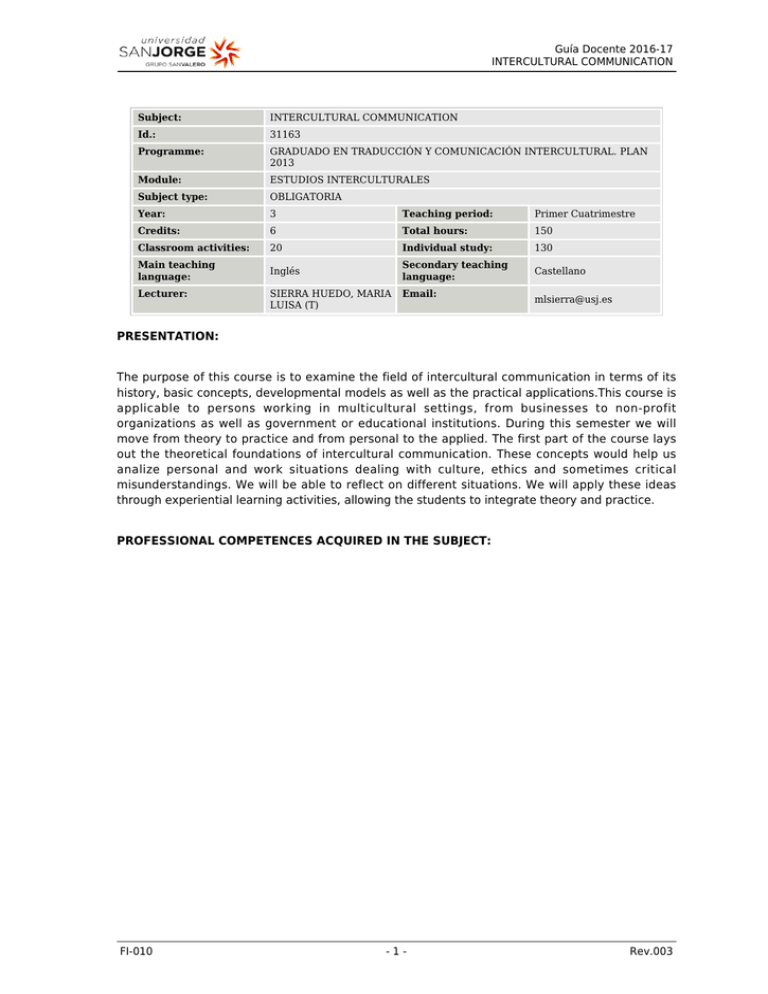
Guía Docente 2016-17 INTERCULTURAL COMMUNICATION Subject: INTERCULTURAL COMMUNICATION Id.: 31163 Programme: GRADUADO EN TRADUCCIÓN Y COMUNICACIÓN INTERCULTURAL. PLAN 2013 Module: ESTUDIOS INTERCULTURALES Subject type: OBLIGATORIA Year: 3 Teaching period: Primer Cuatrimestre Credits: 6 Total hours: 150 Classroom activities: 20 Individual study: 130 Inglés Secondary teaching language: Castellano Main teaching language: Lecturer: SIERRA HUEDO, MARIA LUISA (T) Email: [email protected] PRESENTATION: The purpose of this course is to examine the field of intercultural communication in terms of its history, basic concepts, developmental models as well as the practical applications.This course is applicable to persons working in multicultural settings, from businesses to non-profit organizations as well as government or educational institutions. During this semester we will move from theory to practice and from personal to the applied. The first part of the course lays out the theoretical foundations of intercultural communication. These concepts would help us analize personal and work situations dealing with culture, ethics and sometimes critical misunderstandings. We will be able to reflect on different situations. We will apply these ideas through experiential learning activities, allowing the students to integrate theory and practice. PROFESSIONAL COMPETENCES ACQUIRED IN THE SUBJECT: FI-010 -1- Rev.003 Guía Docente 2016-17 INTERCULTURAL COMMUNICATION General programme competences G02 Capacidad para comunicarse con fluidez con dos o más idiomas extranjeros en una lengua extranjera. G03 Capacidad para identificar los fundamentos de la cultura de las lenguas de trabajo y para aplicarlos en su actividad profesional. G04 Capacidad para organizar y planificar los trabajos y tareas utilizando los recursos a su disposición. G05 Capacidad para afrontar y resolver los problemas de manera eficaz. G06 Capacidad de análisis y síntesis. G08 Capacidad de desarrollar su actividad profesional con un compromiso ético. G09 Capacidad de trabajar con un razonamiento crítico. G10 Capacidad para reconocer y respetar la diversidad y la multiculturalidad. G11 Capacidad de trabajar siempre con una motivación y preocupación por la calidad. G12 Capacidad de aprender y de gestionar su autoaprendizaje a lo largo de su vida profesional. G13 Capacidad de interactuar en las relaciones interpersonales con las habilidades sociales necesarias y según las normas protocolarias correspondientes. G14 Capacidad para trabajar en equipos multidisciplinares. G15 Capacidad para el trabajo autónomo. G16 Capacidad para adaptarse a situaciones nuevas y exigentes y aplicar nuevos conocimientos y nuevas tendencias a su trabajo. G17 Capacidad para gestionar, organizar y manejar la información en diferentes formatos. G18 Capacidad para estudiar alternativas y tomar decisiones justificables. G19 Capacidad de búsqueda de información e investigación. Specific programme competences Learning outcomes G20 Capacidad para desarrollar su actividad profesional en entornos multiculturales y multilingües. E02 Capacidad de comprensión y producción tanto oral como escrita en las lenguas extranjeras de trabajo. E06 Capacidad para mediar lingüísticamente y culturalmente en contextos sociales y empresariales. E08 Capacidad para realizar tareas de investigación y buscar información y documentación especializadas. E09 Capacidad para gestionar y conservar de forma adecuada la información y documentación necesarias para realizar su trabajo. R01 Reflexionar sobre las propias experiencias interculturales. R02 Planificar y proyectar objetivos profesionales y personales futuros. R03 Analizar el desarrollo de la propia competencia intercultural. R04 Aplicar mecanismos de adaptación en situaciones interculturales. R05 Analizar estudios de caso específicos en los que se presentan situaciones de conflicto intercultural. R06 Desarrollar un plan de acción y mejora para estudios de caso específicos en los que se presentan situaciones de conflicto intercultural. PRE-REQUISITES: To have a good command of the English language, not only speaking but a good command of English academic writing. To be registered in this course. SUBJECT PROGRAMME: FI-010 -2- Rev.003 Guía Docente 2016-17 INTERCULTURAL COMMUNICATION Subject contents: 1 - History of Intercultural Communication 1.1 - Introduction 1.2 - Historical context and facts 2 - Intercultural Competence: a definition 2.1 - Introduction 2.2 - Analysis of the current situation 3 - Intercultural Communication: Assessment and Developmental Models 3.1 - The Developmental Model of Intercultural Sensitivity (DMIS) 3.2 - The Stress Factors of the Intercultural Experience 3.3 - An analysis of the intercultural experience 4 - Case Study: The GLOBE Project 4.1 - General overview of the case study 4.2 - Practical use of the case study 5 - Case Study: The SAGE Research Project 5.1 - General overview of the research project 5.2 - Analysis and practical uses of the research project Subject planning could be modified due unforeseen circumstances (group performance, availability of resources, changes to academic calendar etc.) and should not, therefore, be considered to be definitive. TEACHING AND LEARNING METHODOLOGIES AND ACTIVITIES: Teaching and learning methodologies and activities applied: The student should plan accordingly and read carefully the compulsory readings. This will greatly enhance their learning. It is very important to have read, worked and reflected on the readings. A good and professional interculturalist has the following characteristics: Careful observant, good listener, reflective, pays attention to details, curious, respectful and challenges him/herself in order to learn about other cultures and grow as a global multicultural being. These competences, and/or skills need to be worked on and developed, this is why different learning activities have been planned for this course. Student work load: Teaching mode Teaching methods Estimated hours Classroom activities Assessment activities 4 Tutorials 16 FI-010 -3- Rev.003 Guía Docente 2016-17 INTERCULTURAL COMMUNICATION Individual study Tutorials 12 Individual study 55 Individual coursework preparation 25 Research work 12 Compulsory reading 23 Recommended reading 3 Total hours: 150 ASSESSMENT SCHEME: Calculation of final mark: Final exam: Assignment : TOTAL 75 % 25 % 100 % *Las observaciones específicas sobre el sistema de evaluación serán comunicadas por escrito a los alumnos al inicio de la materia. BIBLIOGRAPHY AND DOCUMENTATION: Basic bibliography: BENNETT, Milton. Basic Concepts of Intercultural Communication.Yarmouth: Intercultural Press, 1998. DEARDORFF, Darla K. The SAGE Handbook of Intercultural Competence. London: SAGE, 2009. PAIGE, R. Michael. Education for the Intercultural Experience. Yarmouth: Intercultural Press, 1993. VANDER VERG, Michael; PAIGE, R. Michael and LOU, Hemming. Student Learning Abroad: What our students are learning, what they are not, and what we can do about it. Stylus Publishing, 2012 Recommended bibliography: HOFSTEDE, Geert; HOFSTEDE, Gert Jan. Cultures and Organizations Software of the mind: Intercultural Cooperation and its importance for survival. USA: McGraw Hill, 2005 LANDIS, Dan; BENNETT, Janet M.; BENNETT, Milton J. Handbook of Intercultural Training. Thousand Oaks: Sage, 2004 SAVICKI, Victor. Developing Intercultural Competence and Transformation: Theory, research, and application in international education. Virginia: Stylus, 2008. Recommended websites: EAIE European Association for International Education http://www.eaie.org/ IAICS International Association for Intercultural Communication Studies http://www.trinity.edu idealist http://www.idealist.org IIE Institute of International Education http://www.iienetwork.org FI-010 -4- Rev.003 Guía Docente 2016-17 INTERCULTURAL COMMUNICATION Intercultural Development Inventory www.idiinventory.com NAFSA: Association of International Educators http://www.nafsa.org/ SIETAR Society for Intercultural Education Training and Research http://www.sietareu.org/ FI-010 -5- Rev.003
